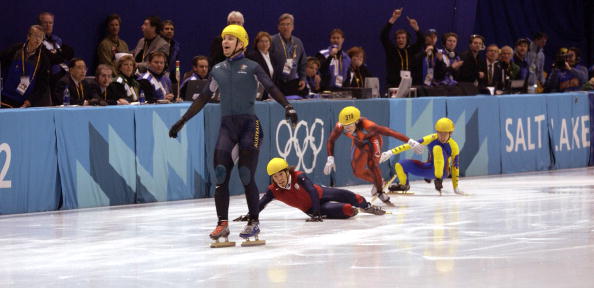Here is the definition of irony. The International Olympic Committee has spent a great deal of this past year building bridges between the worlds of sport and politics. Then the government of Norway decides not to bid for the 2022 Winter Games. So what does the IOC do?
It issues a statement in which it opts not for its usual measured tones in assessing the Norwegian government and political establishment. The release calls the Norwegian decision a “missed opportunity.” It says the Norwegians didn’t come to a meeting — that the Norwegians themselves asked for, the IOC notes — and thus the move to bow out of 2022 was taken on the “basis of half-truths and factual inaccuracies.”
Not even two weeks ago, at the Asian Games in Incheon, South Korea, IOC president Thomas Bach let the world in on the secret that everyone knows but that, until now, no IOC president had dared utter out loud: sports and politics do mix.
For sure they do.
As Bach said that day in Korea, “In the past, some have said that sport has nothing to do with politics, or they have said that sport has nothing to do with money or business. And this is just an attitude which is wrong and which we cannot afford anymore.
“We are living in the middle of society and that means that we have to partner up with the politicians who run this world.”
On Thursday, in an interview with Associated Press, Bach said the Norwegian bow-out was “a political decision.”
Back to that IOC statement Wednesday, which is attributed to the Games' executive director, Christophe Dubi. It ends with the observation that the IOC will "work closely with the Olympic Movement in Norway to make the Lillehammer Youth Olympic Games in 2016 a success for the young athletes." Curiously, there is no mention of the politicians with whom the Olympic movement is going to have to work to make those Games successful.
Meanwhile, Bach also said Thursday that, going forward, the IOC has “to communicate, to communicate, to communicate,” and in particular about the distinction between the two different budgets involved in any Games — the operating budget and then, separately, the capital or infrastructure projects associated with an Olympics that typically swell “costs” way beyond the line-item budgets of the Games themselves.
For instance, the Sochi Games’ operating budget was $2.2 billion.
But the number that is in many minds is $51 billion.
Why is that?
Whose job is it to explain the simple difference between what it costs to run a Games and the add-on projects? In Sochi, they essentially built two cities from scratch. That takes, well, a lot of scratch — way more than $2.2 billion. That’s the IOC’s job to explain.
If the IOC says, well, that's for Sochi 2014 organizers -- not unreasonable -- the fact is that already Sochi has come and gone and now the entity that is left, the only source for anyone to ask questions of, is the IOC. This is just the way it is.
Ask anyone how much the Sochi Games cost.
See if you get $51 billion.
It is not, and let's be clear about this, the fault of the media if the media gets $51 billion. If there is a different story to be told -- we are all here to be told otherwise. That is freshman-year journalism.
It has been pointed out in this space before that the IOC is not very good at communicating.
This is something of a mystery.
It is not — repeat, not — the opinion here that the IOC members are a bunch of bribe-taking fat cats who only want to swill champagne and eat shrimp in black limousines. That is just a stupid caricature.
The members are, for the most part, hugely passionate women and men trying to make the world even just a little better through sport.
There is — and long has been — a huge disconnect in communicating this story.
Whatever it is, the IOC for the most part often does not know how to do it. Why this is — dunno.
It must be acknowledged, however, that -- right or wrong -- the widely held perception of the IOC, and the members, is a major, major factor in the rejection of the 2022 Games across Europe these past several months.
That, and the $51 billion.
The most salient fact to have come out in all the months of the 2022 campaign is that the IOC has $880 million to give to the winner. $880 million! That’s nearly, or maybe even more than, half the money it’s going to take for the operating budget.
Two days ago, the IOC buried this fact under a list of 14 names in another release when it should have been shouting it from the mountaintops.
Since then, the IOC has actually recognized that $880 million is a lot of money and has been putting it up high in its releases as Bach and other officials have been talking about it, and a lot.
As for the Norwegians not showing up at the meeting — hello? So perhaps they dissed you. It happens. Call them anyway. Say, we just want to make it clear you know we have $880 million. We are trying to build bridges between sport and politics. We are for sure talking to our friends in Beijing and Almaty about this, too.
Bach now says the IOC is sticking to its process, that it has two cities and that’s that.
That could assuredly be a reasonable position to articulate.
In the meantime, however, it might be interesting to hear why the IOC was so willing a few weeks ago to adapt its Host City contract, ostensibly in a bid to benefit all cities. Clearly, China and Kazakhstan aren’t really worried about the cost of the Games. Never have been.
So where are we now?
On the one hand, it’s entirely possible — indeed, probable — Almaty might win. Because of certain backstage influences that are well-known within IOC circles, Almaty has a huge upside.
On the other hand, what if Almaty can’t quite get it together to even make it to the vote next July?
It’s not the bid team.
It’s the government.
For one thing, over there, they are still mulling over the IOC's technical report from earlier this year that reviewed the-then three candidate cities.
Oslo ranked first in eight of the 14 categories and tied with Beijing in three more. Almaty was not first even once; it did, however, sit last in 11 of 14.
In Kazakhstan, they are still working it all out.
This latter scenario -- Almaty out altogether -- is not entirely unthinkable.
Then you’d have Beijing, and Beijing only.
If you are the IOC and you have even an inkling that you might be down to a one-horse race, wouldn’t you err on the side of caution and look for a way to mitigate that risk?
If, indeed, you are building bridges between sport and politics, aren’t you on the phone right now to the authorities in Almaty to find out what’s what?
One more time:
It’s October 2014. The all-members vote for Agenda 2020, Bach’s review and potentially far-reaching reform process, is in Monaco in December. The very best thing to do would be to call for a six-month delay of this 2022 process, incorporating whatever changes come out of Monaco, if any.
If no other city wants in post-Monaco, so be it.
But at least let the world have at that $880 million.
And, IOC, give yourself a chance “to communicate, to communicate, to communicate.”








